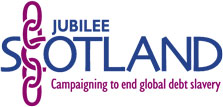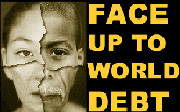

|
The Jubilee 2000 Scottish coalition succeeded in putting the issue of debt onto the international agenda at a historic G8 Summit meeting in 1998 and in pushing for reform of the World Bank and IMF HIPC initiative in 1999. Jubilee Scotland have taken this work forward and have been instrumental in forcing the UK government to adopt a more radical approach to ending the debt crisis in poor countries. Past achievements:
All Hands on Debt & Face Up to World Debt In 2001 the Jubilee Scotland ‘All Hands on Debt’campaign collected a nation-wide petition of hand-prints to highlight the continued concern of the Scottish people that the debt crisis had not disappeared. This campaign was followed by ‘Face Up to World Debt’in 2003, a photo petition with similar aims. Both these campaigns served to show the UK government that people were not resigned to accepting the debt relief process that merely reduced poor country debts to levels in which they could then begin to pay them back again. Disappointment was also based on the fact that while the UK had promised to pay-off $100 billion worth of debt in 1999, the reality was that only $36 billion had actually been delivered.
As public support began to grow, so did frustration that the UK government continued to resist demands for further reform of HIPC and providing full 100% debt cancellation. In 2004 with a new campaign‘Call For Change’ Jubilee Scotland changed tactics and challenged the UK to cancel its proportion of poor country debts owed to the World Bank and International Monetary Fund.
Jubilee Scotland was therefore insistent that the UK cancel these debts if it was serious about ending the debt crisis. ‘Call For Change’ produced another petition calling for a cancellation of debts. This time however, the cancellation was for the debt owed to the UK as a World Bank and IMF member rather than just the UK as a nation. It had been four years since the end of Jubilee 2000 campaign and supporters were still waiting on justice. But the reality was that no one was happy with the current situation. Most observers recognised that the current debt relief process was proving ineffective. For many poor countries, unsustainable debt was still a huge drain on vital national resources. Not only was the HIPC initiative ineffective at reducing a significant amount of debts, it was also accused of making poor countries jump through excessive hoops to actually receive debt relief. Finally in September 2004 Gordon Brown made a speech signalling that the UK would cancel the World Bank and IMF debts - a hugely significant achievement for the British people. But this was only the start; the real challenge was to push the rest of the G8 to make a similar commitment.
|
© 2006 Jubilee Scotland
Last modified 05-Nov-2008
 Since
2001, after the millennium campaign Jubilee 2000, Jubilee Scotland
have been putting pressure on the UK government and the world's
richest countries to cancel 100% debt of the poorest countries in
the world.
Since
2001, after the millennium campaign Jubilee 2000, Jubilee Scotland
have been putting pressure on the UK government and the world's
richest countries to cancel 100% debt of the poorest countries in
the world.

 In
1996 the UK government had committed to cancelling debts owed directly
to the UK (bilateral debts) but the reality remained that most of
the debts owed by poor countries was owed to multilateral lenders
– the World Bank, IMF and African Development Bank. This money
was effectively owed to the UK, as the UK is one of the largest
donors to these institutions - The World Bank and IMF can only make
loans because of funding provided by members such as the UK, US
and Japan.
In
1996 the UK government had committed to cancelling debts owed directly
to the UK (bilateral debts) but the reality remained that most of
the debts owed by poor countries was owed to multilateral lenders
– the World Bank, IMF and African Development Bank. This money
was effectively owed to the UK, as the UK is one of the largest
donors to these institutions - The World Bank and IMF can only make
loans because of funding provided by members such as the UK, US
and Japan. 2005
was therefore a year that heralded great potential for Jubilee Scotland.
This was heightened by the fact that the G8 Summit was being held
in Scotland in July and that the UK government was the host nation.
With the UK adopting a policy of full multilateral debt cancellation
for HIPC countries there was a real chance that the rest of the
G8 would come on board.
2005
was therefore a year that heralded great potential for Jubilee Scotland.
This was heightened by the fact that the G8 Summit was being held
in Scotland in July and that the UK government was the host nation.
With the UK adopting a policy of full multilateral debt cancellation
for HIPC countries there was a real chance that the rest of the
G8 would come on board.